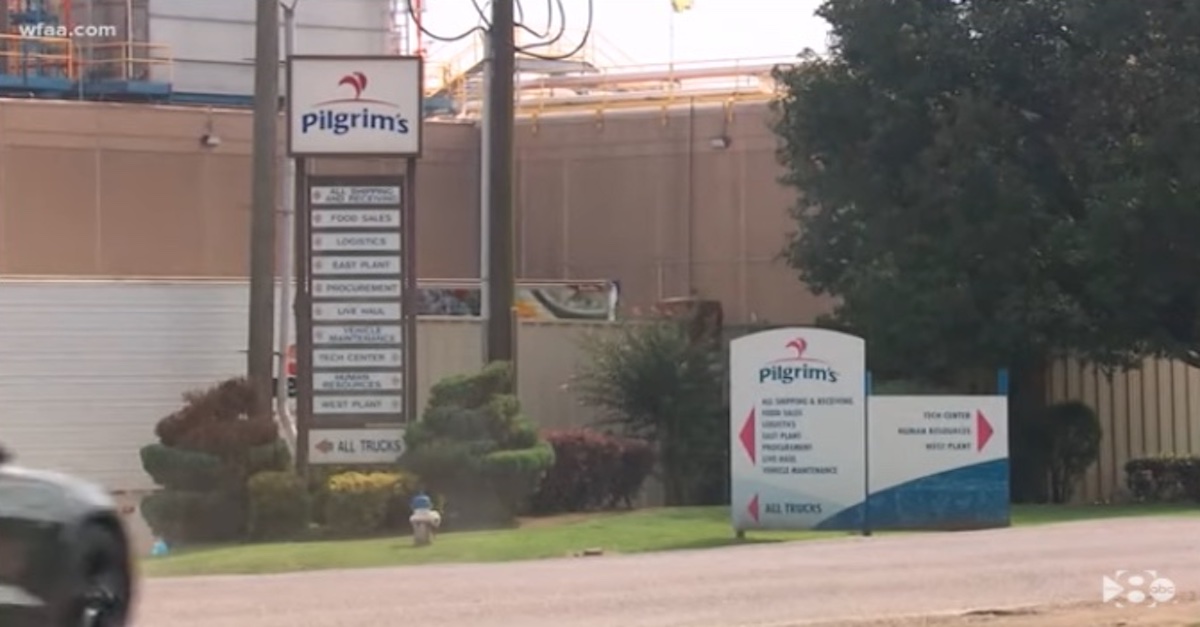
At a meatpacking plant in Mt. Pleasant, Texas, the first few months of the coronavirus were business as usual, according to Sybil Elijah and Elnora Brown. Sybil and Brown went to work as usual, where they allegedly were not required or instructed to wear a mask, or take other precautions, until late May or early June.
According to a lawsuit filed in federal court in Texas, Sybil, a custodian at the Pilgrim’s Pride facility in Mt. Pleasant, tested positive for the coronavirus on May 22, 2020. Two days later, her husband David Elijah, who was disabled and homebound, was dead from COVID-19.
Almost one month later, Elnora, a plant employee, died from COVID-19.
Now, Sybil Elijah and Rayford Brown, Elnora Brown’s husband, are suing Pilgrim’s Pride and its parent company, JBS USA Holdings, Inc. (JUHI), claiming that work conditions at the plant exposed them and their spouses to the coronavirus.
JBS, however, says that a new Texas law protects the company against liability.
Elijah and Brown, who sued in federal court in Texas in April, say that JBS and Pilgrim’s Pride didn’t provide its employees “timely information and training about COVID danger.”
According to Elijah and Brown, Pilgrim’s Pride also “required its employees to work long hours in cramped conditions. Moreover, despite the danger of COVID-19, Defendant Pilgrim’s Pride failed to provide appropriate personal protective equipment and failed to implement social distancing or safety measures to protect workers from the outbreak.”
Elijah and Brown say that because JBS and Pilgrim’s Pride kept the plant where they worked open, even after an outbreak in May 2020, the defendants knew, or should have known, that if the plants didn’t follow OSHA and CDC guidance, “workers would become infected with and some would succumb to COVID-19.”
“Instead, the Defendants placed profits over safety,” the complaint says.
Indeed, reporting at the time confirmed local outbreaks could be traced back to the Pilgrim’s Pride plant at Mt. Pleasant.
Now, in its first filing in the case, JBS is saying that thanks to a new Texas law, retroactively applied, the plant is shielded from liability.
According to JBS’s motion to dismiss, filed on July 9, the new law, known as the Pandemic Liability Protection Act (PLPA), protects JBS against liability, and Elijah and Brown’s complaint doesn’t meet the statute’s requirements to pursue a lawsuit.
Under the new law, business are essentially protected from liability for exposing people to the coronavirus unless it can be proven that the business “knowingly failed to warn or remediate a condition” that the business knew was “likely to result in exposure to the disease,” and even then, only if the business had control over the condition, knew that someone would come into contact with the condition, and could have fixed it before contact was made.
Moreover, the business must have “refused to implement or comply with or acted with flagrant disregard” of safety “standards, guidance, or protocols,” and “reliable scientific evidence” must show that this conduct was the “cause in fact” of the person falling ill.
Texas Gov. Greg Abbott (R) signed the PLPA into law in June. The law applies retroactively to lawsuits filed after March 13, 2020 in which there has not been a final judgment.
“The PLPA … immunizes JUHI from Plaintiffs’ causes of action,” the motion to dismiss argues. “[I]f Plaintiffs intend to proceed forward with a lawsuit against JHUI for Mr. Elijah’s and Ms. Brown’s deaths allegedly due to complications from COVID-19, Plaintiffs must refile their lawsuit in strict accordance with the PLPA and satisfy the statute’s heavy burdens established by the Texas Legislature, which includes showing that JUHI acted with actual knowledge while also satisfying a heightened causation standard erected under the PLPA.”
JBS argues that the plaintiffs’ claims won’t stand, because the Texas PLPA limits claims to only those who were “directly exposed to COVID-19 by a defendant who knowingly failed to warn of or remediate a condition or knowingly failed to implement or comply with government-promulgated standards, guidelines, or protocols.”
Under the PLPA, a defendant may be held liable only if that particular defendant “exposed the individual” to COVID-19, which, JBS argues, the complaint doesn’t show.
“There are no allegations in the complaint showing that either Mr. Elijah or Ms. Elijah ever entered any JUHI facility or interacted with any JUHI representative in 2020,” the motion to dismiss says. Accordingly, neither could have been exposed to COVID-19 by JUHI. Rather, as the complaint states, Mr. Elijah was exposed to COVID-19 by Ms. Elijah. And that concession in the complaint is fatal to the wrongful death and survivor claims filed by Ms. Elijah.”
“Similarly,” the complaint continues, “there are no allegations in the complaint showing that Ms. Brown ever entered any JUHI facility or interacted with any JUHI representative in 2020. Rather, the complaint includes the conclusory assertion that Mr. Brown ‘was exposed to SARSCoV-2 and contracted COVID-19 at the Plant,’ which Plaintiffs identify as one of Pilgrim’s unidentified facilities located in Mt. Pleasant. Accordingly, Ms. Brown could not have been exposed to COVID-19 by JUHI.”
JBS also disputes the “scientific evidence” that Elijah’s and Brown’s spouses died from COVID-19.
Texas is one of at least a dozen states, including neighboring Oklahoma, Louisiana, and Arkansas, that have passed legislation protecting businesses from liability for COVID-related injuries or deaths.
JBS also argues that the court should dismiss the lawsuit for other reasons, including a lack of personal jurisdiction, failure to allege facts to support the plaintiffs’ fraud and misrepresentation claim. The defendant argues a parent company is not liable for a subsidiary’s conduct.
Read the motion to dismiss, below.
[Image via YouTube screengrab/WFAA ABC8]